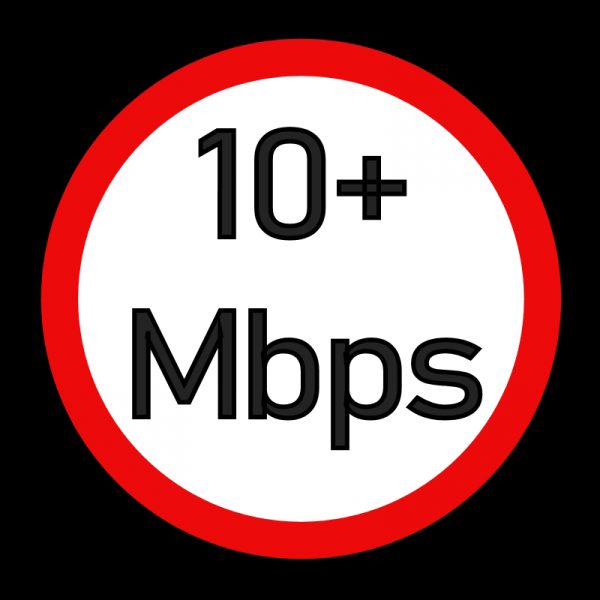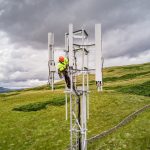Ofcom Sets Out Funding Rules for 10Mbps UK Broadband USO

After the fact. Ofcom has today set out the final funding regulations for their legally-binding Universal Service Obligation (USO), which went live in March (summary) – supplied by BT and KCOM – and aims to ensure that people in disadvantaged areas can request a minimum broadband speed of “at least” 10Mbps (1Mbps upload).
Strange as though it may seem, the USO actually ended up going live BEFORE the regulator had finished setting out the full detail of their rules for funding the obligation. The basic template was there for all this but some key details were missing, such as with respect to the procedures for any compensation that the Universal Service Providers (USPs) may claim for delivering the USO, particularly any “unfair costs“.
On top of that there was an absence of information on how such a fund would operate (i.e. those who will contribute and in what proportions, and how funds would be collected and distributed), although we know that it’s intended to be cost neutral (i.e. USPs will gain neither a cost advantage nor disadvantage from delivering the USO) and the net cost of meeting these obligations will be determined by several factors (e.g. the number of eligible premises, the technologies used and the cost of building the infrastructure).
Advertisement
Ofcom will however only establish an industry fund for the USO if they “find that there is an unfair net cost burden” being imposed on the USPs due to its delivery (this hasn’t happened.. yet). In reality there may well be some deployments that attract a high cost and so might need to dip into such a fund (a cost threshold of £3,400 applies to USO connections – balanced against forecast take-up) or be excluded if too expensive.
The new regulations allow for quite a wide section of the industry – both fixed and mobile providers – to potentially contribute toward such a fund (cost recovery), albeit with some limits to protect smaller providers and new entrants (based on a turnover threshold). Otherwise here are the final funding conclusions and yes, some of it is still a bit vague.
What Ofcom Have Decided
• A USP can request that Ofcom reviews their request for funding for the cost of delivering the USO, minus any benefits associated with being the USP (net cost). We expect to review no more than one request for funding per year, and it is for Ofcom to decide on the scope of a review and when the review will begin.
• A USP must submit appropriate information to support their request for funding. We provide guidance on this information in the Statement. For the purposes of the broadband USO, we also separately require the provider to submit specific financial information, for example, capital costs incurred and forecasts of future revenues and costs.
• When carrying out a review, Ofcom will need to determine the existence and level of any net cost. We will review the information submitted by the provider and assess whether the costs incurred in delivering the USO were efficient. There will be a separate process to check our calculation including, if appropriate, by an independent party.
• Once we determine a net cost, we will decide whether it would be unfair for the provider to bear some, or all, of that cost. Our approach includes considering: the cost to Ofcom and industry of establishing and administering an industry fund; the impact on the provider of bearing these costs alone; the method of designating the USPs; and the outcome of any previous determinations.
• If we find USP have incurred unfair costs, we may establish an industry fund to compensate them. We will also determine who will contribute to the fund and how much they will contribute. This will include any threshold below which contributions will not be required.
• Once we have established an industry fund, we will collect monies from industry and compensate the USP. We will gather and check relevant information to calculate individual contributions. We will then invoice each provider required to contribute. When we start receiving the contributions, we will pay the USP on a monthly basis.
So far it’s been hard not to see the USO as being a bit of a disappointment, which is partly down to its minimum speed (although a faster speed would have created various complications with competition, high cost and potential delivery delays) and the fact that Ofcom allowed the use of highly variable 4G mobile (mobile broadband) tech to be used (alongside fixed FTTC or FTTP methods).
Technically just 2% of UK premises (608,000) receive fixed broadband speeds under the USO level, but if 4G is added then this gap drops to 189,000 premises (BT previously estimated that around 100,000 premises may be too expensive for the USO to tackle). Not that 4G can’t be quite a useful solution in many areas, but putting any kind of guarantee behind its performance is fraught with difficulty due to the highly variable nature of its signals and mast capacity.
Advertisement
None of this was helped by the fact that the USO was set to launch just as the COVID-19 crisis began to really bite. At the time BT was struggling due to a related shortage in their support teams and it didn’t help that their initial messaging left many people confused (likewise their CS staff seemed generally unprepared, despite having a year to get ready).
Just remember, if you get offered a 4G solution and it doesn’t work out, or the USPs find you aren’t eligible, then you can complain (here). Often this will trigger a more detailed review of your case and coverage.
Mark is a professional technology writer, IT consultant and computer engineer from Dorset (England), he also founded ISPreview in 1999 and enjoys analysing the latest telecoms and broadband developments. Find me on X (Twitter), Mastodon, Facebook, BlueSky, Threads.net and Linkedin.
« ISP BT Updates on Progress Toward Sustainability Targets
Granahan McCourt Exits N.Ireland Superfast Broadband Project »






















































If I was BT i’d have refused to provide on the basis of those terms. Its as clear as mud to both the USO and other providers…
I don’t see that USO will cost much at all – ADSL2+ with at least 10Mbps down are being classed as meeting USO (regardless of upload speed), those with less than 10Mbps download are being told to use 4G. Those that can’t get 4G are being quoted astronomic costs (which may well represent the actual costs involved, but meaning that the build won’t happen so the only cost is preparing the quote itself).
Quite possible, With 4G thrown into the allowable tech. The forums fairly regularly throw up questions from people asking about 4G for home broadband, and they’re just the few that end up here or on TBB, There must be thousands who either don’t require better or haven’t even considered 4G as an upgrade.
Selfishly i’m hoping that not too many near me realise its a good option, we’re rural dispersed and have poor adsl so it’s a fair bet if they all switched then performance would suffer.
Yes, 4G performance drops with the number of users – especially in rural areas with lower bandwidths. I used Three for a couple of years, and told neighbours about it. It became unusable, so I swapped to EE (more expensive, but they have more bandwidth in my area).
better than ADSL, but not as good as fixed line broadband wrt latency, public and fixed IP addresses etc.
4G isn’t the solution for everyone, remember there are populated areas without decent mobile coverage due to community rejecting masts on health and appearance. What’s the solution?
Still waiting for confirmation that BT / OR will provide the detailed quote
I’ve been given the costs but no breakdown
Anyone managed to get the detailed quote as OFCOM have suggested is a right?
doubting
Well the first responses should be within 30 days of contacting the provider, i.e. at the end of the 30 days you should have been told if eligible or not and if eligible whether you need to contribute any money above the £3,400 if you want the service to be delivered.
Once work to deliver the USO service has been agreed the provider has a year to deliver the service.
I assume you had a number and that number is greater than the 3,400
there is nothing that I can ascertain you have to be provided with the breakdown of what that quoute entails –
“In excess of £100,000”
The UK legislation passed was to introduce a Universal Service Obligation (USO) for broadband as a “UK-wide measure intended as a “safety net” to deliver broadband to those premises that do not have access to a decent and affordable connection. ” Ofcom in my view are failing to meet the act.
Those being recommended 4G could avail themselves of that anyway and those that have no choice appear to be given an individual provision quote hardly any can afford. I had hoped that BT would be able to consolidate USO requests and aggregate the subsidies but clearly that isn’t happening. I know Ofcom do not want it to impact other funding initiatives but their current approach means that the USO is totally ineffective and just encourages BT to await fore more beneficial arrangements for FTTP in areas outside their contracts (BDUK etc).
BT group appear to be treating the USO as nothing more than a sales opportunity for the EE division.
I am waiting for a detailed breakdown of costs and am intending to complain to Ofcom as an initial estimate of £500-1000 for the work has increased ten times to £5.5k. 4G is not an option in my home, despite the fact I live within the M25…The USO is the normal toothless protection, the BT guy on the phone even admited to me that it has been worded deliberately vague and is a “right to enquire about a 10mb connection not the right to a 10mb connection”. The battle for half decent broadband goes on…
I had my first breakthrough with my USO request today. Ive received an Email from BT stating the following:-
We now have a quote for building a new broadband network. We’ll save this quote for six months for you.
We’ll be in touch shortly to discuss it. If you have any questions in the meantime, you can call us on the number below.
So now i’m patiently waiting for the bad news. My initial verbal estimate was £30-40,000.
Hopefully, I can get a full breakdown of costs which can be passed on to my MP who is already aware of my request.
Just as background, I have a 17ish meg download and a paltry 0.4 meg upsteam which throttles my downstream. This is with an FTTC connection. My request was passed through as an exceptional case.
BT USO – a total shambles. Several residents have been quoted “in excess of £100,000” to upgrade to fibre. One person was told by advisor that it’s a “box ticking exercise” to be seen to be meeting USO legislation. BT CEO has been made aware – residents have been fobbed off! Appalling service.
Having taken it up with BT CEO, Matt Warman MP and others, BT appear to be doing a U-turn and having a rethink of their USO policy. We wait in hope!